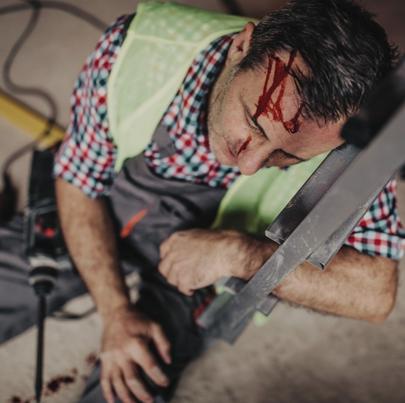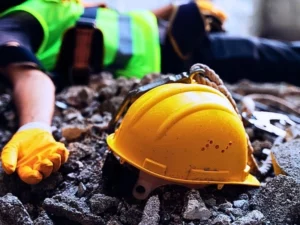In Illinois, any injury that arises out of the performance of a worker’s job duties is generally considered to be a work-related injury. However, understanding what qualifies as a work-related injury and proving that an injury is work-related is not always a clear path to receiving workers’ compensation benefits.

Common Work-Related Injuries
Work-related injuries and illnesses occur every day in all types of occupations. Injuries may be caused by accidents, exposure to dangerous work conditions, and even intentional harm by angry co-workers on the job. Whether you’re a healthcare worker, you’re employed in the construction and building trade, an industrial factory or warehouse, a transportation job, or a service industry like a hotel, restaurant, or retail store, you can become the victim of a work-related injury.
The most common work-related injuries include:
- Slip and falls
- Construction accidents
- Contact with objects and equipment
- Exposure to hazardous substances
- Overexertion
- Transportation accidents
Slips, Trips, and Falls
Slips, trips, and falls are common in every type of occupation. In some cases, injuries may be minor if a worker falls on the same level or catches himself/herself from falling to the ground. Falls from heights usually result in more serious injuries. Falling from roofs, scaffolding, or ladders, falling through surfaces, and falling from collapsing structures are common in the construction industry. Construction workers suffer the highest rate of injuries and deaths from falls.
Contact with Objects and Equipment
Contact with objects and equipment is a leading cause of injury that results in days or weeks missed from work for U.S. workers. Construction workers and factory workers suffer the highest rate of injuries and/or deaths from contact with objects and equipment. They are more likely to be hit by falling objects, become squeezed in between moving machinery, or get run over by forklifts and other large equipment.
Exposure to Hazardous Substances
Exposure to hazardous substances and hazardous chemicals is another leading cause of work-related injuries and illnesses. Workers may be injured by exposure to toxic chemicals, radiation, electricity, extreme temperatures, loud noises, and traumatic or stressful events. Construction workers, industrial workers, electrical workers, and workers who work underground have the highest injury and death rates for exposure to hazardous substances.
Overexertion
Overexertion injuries occur from physical movements and repetitive motions. Non-impact injuries are caused by excessive physical effort used in normal job duties such as constant lifting, holding, carrying, pushing, turning, or throwing. Repetitive motion injuries are caused by micro-tasks that don’t require a lot of physical effort but place continual strain on specific parts of the body. Factory workers who work on assembly lines, machinery operators, and office workers have the highest injury rates for overexertion.
Transportation Accidents
Transportation workers such as bus drivers, taxicab drivers, rideshare drivers, and delivery drivers are exposed to hazardous road and driving conditions on a regular basis. The dangers for transportation workers are often compared to similar job risks faced by police officers and other first responders. Workers must deal with traffic and road conditions, weather conditions, and interactions with the public. Transportation workers face higher injury and death rates from work-related transportation accidents.
Determining What Qualifies as a Work-Related Injury
To qualify as a work-related injury, the injury must occur in the workplace and arise out of the performance of a worker’s job duties. That may include an injury directly caused by a workplace accident, unsafe work conditions, overexertion, or an injury exacerbated by a prior work-related injury.
Injuries Do Not Have to Happen On Company Property to Qualify as a Work-Related Injury
Although most work accidents happen on company property, they may also occur in other environments. As long as the worker is performing duties related to his or her job when the accident happens, it can qualify as work-related. For instance, if you were driving a company-owned vehicle for the benefit of your employer, and you were injured in a car accident, your injury is most likely work-related. Likewise, if you were injured at a company-sponsored event, your injury will probably qualify as work-related.
Alternatively, just because an accident happens while a person is at work does not mean it qualifies as a work-related injury. For example, if you were visiting your place of work as a member of the public when you got hurt, your injury probably won’t qualify as work-related. Additionally, if you caused a physical fight at work, and got injured, you probably won’t qualify for workers’ compensation benefits.
How Workers’ Compensation Lawyers Determine What Qualifies as a Work-Related Injury
A good rule of thumb that workers’ compensation attorneys use to determine what qualifies as a work-related injury is if the worker is engaged in a task that would in some way benefit his/her employer. If the answer is yes, the injured worker generally qualifies for workers’ compensation benefits.
Illinois law requires employers to carry workers’ compensation insurance that covers employee work-related injuries. A worker who suffers a work-related injury or illness is entitled to workers’ compensation benefits to recover damages. If the claim is approved, benefits can pay for medical expenses, lost wages, physical therapy expenses, vocational rehabilitation costs, job retraining costs, and temporary or permanent disabilities.
What to Do if Your Condition Qualifies as a Work-Related Injury
Taking the right steps after a work-related injury can help ensure your workers’ compensation claim is approved. This includes:
Notifying Your Employer
If you are injured on the job, you are required to notify your employer in writing within 45 days of the accident. This is the first step in the workers’ compensation claim process. When the employer receives written notification, he/she files a claim with the Illinois Workers’ Compensation Commission (IWCC), the state agency that is responsible for evaluating and approving all workers’ compensation claims. If you fail to notify your employer before 45 days are up, your claim will likely be denied unless an exception applies.
Getting Medical Treatment
It is critical that you obtain medical treatment for your workplace injury. If you do not seek treatment from a medical professional, your injuries won’t be documented. The insurance company will most likely claim that your injuries were not severe, or were not work-related.
If you need immediate medical treatment, go to the nearest emergency room or urgent care center. Otherwise, you will be referred to a physician who will provide you with a medical evaluation, diagnosis, and treatment plan. Your physician will keep detailed medical notes and records that indicate important information about your injury, including:
- The severity of your injury or illness
- The prognosis for your recovery
- Your ability to resume your normal job duties
- The need for rehabilitation and/or job reassignment
- The probability of temporary or permanent disabilities
- Any pre-existing injuries, illnesses, and health conditions
The IWCC looks closely at all medical notes and records by physicians who examine workers with work-related injury claims. The approval of a work-related claim and workers’ compensation benefits may hinge on your medical records and your independent medical exam (IME).
What Happens During an IME?
During an IME, the assigned physician will interview you to gather details about your work-related accident and injury. After the interview, you will undergo a medical evaluation and examination to assess the severity of your injury. The physician will be looking for signs of physical injury, signs of physical or mental impairment, and levels of pain and distress. He or she will perform certain tests to pinpoint pain, discomfort, sensitivity, and impairments. For instance, if you have a neck or back injury, you will likely be required to perform a variety of turning stretching, and bending movements that impact your neck and back.
During your examination, the physician will also ask questions related to your general health and existing health conditions. You may be asked if you smoke, drink alcohol, or use recreational drugs. You may also be asked about your diet, exercise, and sleeping routines. These questions will be asked to determine if any of your lifestyle behaviors may have contributed to your work-related injury.
IME physicians are trained to look for inconsistent accounts of how injuries occurred, as well as exaggerated pain and untruthful statements. During an IME exam, it’s wise to give honest and accurate information about your work-related injury or illness. Otherwise, you run the risk of your workers’ compensation claim and benefits getting denied by IWCC.
Proving Your Condition Qualifies as a Work-Related Injury
Your IME evaluation, exam, and medical report play a big role in determining what qualifies as a work-related injury and proving your injury is work-related. The IME and your medical records are not the only factors considered, however. Even when your injury technically qualifies as a work-related injury, your employer and their insurance provider may try to disqualify your claim for compensation.
When IWCC receives a workers’ compensation claim, the claim is assigned to a workers’ compensation claims adjuster. This adjuster’s job is to gather information about the claimant and the injury that supports or negates the claim. If you file a workers’ comp claim, you are not required to talk to a claims adjuster, but it’s likely that you will be contacted by one to discuss the details of your work-related accident and injury. Knowing what not to say to the worker’s comp adjuster is just as important as what you do say.
When a workers’ comp adjuster is assigned to investigate your claim, he/she may not have your best interest at heart. Claims adjusters work for insurance companies, so their goal is to disprove your claim and save the insurance company from paying out benefit payments. They will attempt to find holes in your claim and inconsistencies in your story, so they can deny that your condition qualifies as a work-related injury.
How Claims Adjusters Determine What Qualifies as a Work-Related Injury
Workers’ compensation claims adjusters are trained in workers’ compensation state laws and processes. Their role is to determine whether a claim qualifies as a work-related injury. If it is a compensable claim, they determine the number of benefits to be paid. In short, a claims adjuster’s job is to analyze workers’ compensation claims, review documentation, and determine the benefit due by carrying out various tasks such as:
- Reviewing your workers’ compensation insurance policy
- Confirming that your claim was filed within specific time limits
- Gathering your medical reports from physicians
- Interviewing witnesses to your accident
- Finding out your average weekly wage prior to your accident
- Watching for any red flags that can be used to deny your claim
Claims adjusters are also responsible for negotiating settlement agreements between the claimant and the insurance provider. Without a workers’ compensation lawyer who can oversee the process and ensure you receive a fair settlement for your work-related injury or illness, you will be left to deal with the claims adjuster on your own.
Should You Hire a Worker’s Compensation Attorney
Most insurance adjusters will tell you that hiring an attorney will only prolong your case. They may also tell you that after the lawyer takes his/her percentage, you will be left with very little money. None of this is true. In fact, people who hire workers’ compensation lawyers are more likely to get their claims approved. This is especially true for workers’ compensation cases that aren’t clearly work-related or when victims need prolonged medical care.
Your lawyer will be able to help you understand more about what qualifies as a work-related injury. He or she will guide you through your workers’ compensation claim to make sure your rights are protected. Your lawyer will gather your medical records and enlist the help of medical experts if necessary. Your attorney will also communicate with your employer, communicate with IWCC and insurance providers, and help you prove that your injury qualifies for workers’ comp benefits.







